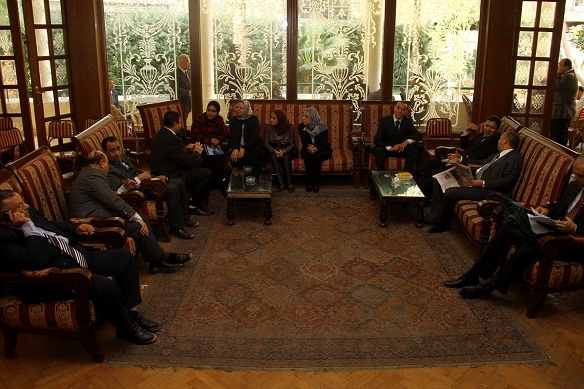It is often debated whether or not those who lived through historically significant periods are actually the best narrators of these events. Throughout history’s most important happenings, often the best narrations came from those who did not live through the events themselves, but rather studied them closely decades later.
There is no doubt that both the 25 January Revolution as well as the 30 June Uprising are significant turning points in Egyptian history that managed to change the lives of many. While the 25 January Revolution was highly celebrated and documented in many countries and nations, the 30 June Uprising was relatively neglected.
The 25 January Revolution took place at a time when the makers of Egyptian and Arab television dramas were highly interested in politics. El Gamaa, or The Political Party, was a massive television hit in 2010, debuting only a few months before the regional uprisings.
The series showed the Muslim Brotherhood, explaining their inception, guidelines, and vision. El Gamaa’s success and the political events that took place only a few months later encouraged many writers to focus on politics and more specifically on the revolution.
The series continued up through the 30 June Uprising. While the protests were raging in the streets other series like El Daeya, The Preacher, as well as Esm Moakat, Temporary Name, took a firm stand against the Muslim Brotherhood. The first series even went so far as to predict a revolution against the regime. In one of the scenes the main character even organises a protest in front of Itihadiya Palace.
With that said, after the 30 June Uprising many series took a different direction. The year’s main drama season, Ramadan, saw many TV productions taking a different direction in their topics, recognising that the industry was over saturated with politics after two years of constant political themes.
During that time, however, a few series still managed to tackle the subject. Aad Tanazoly, Descending Count, was a story revolved around a man convicted of the assassination of the Minister of Interior.
On the other hand, Ibratoreyet Mien, Whose Nation, and Bien El Sarayat took a focus on the more societal aspects of politics as both series reflected the life of ordinary people between the two events. While the first series was light and comedic, the latter depended on dramatic twists.
In the current season of TV shows, marking the 30 June Uprising’s third anniversary, politics have been mostly pushed aside. Nonetheless, a few productions managed to squeeze in stereotypical characters representing the Muslim Brotherhood.
Maamoun w Shorkah, Maamoun and His Partners, starring Adel Imam, has attracted massive criticism due to its political and religious content. The series narrates the story of a big family that branched out into many religions and political viewpoints through marriage.
Many social media users expressed anger and discontent towards many of the stereotypes presented in the series. Furthermore, a majority of the negative comments focused on one particular character who is portrayed as a deeply religious man. The script implies the character also belongs to certain Islamic parties.
The shallow representation of the character is meant to be comedic rather than dramatic, with many viewers criticising the fact that this particular character is often belittled and cornered in stupid scenes.
In addition to the behavioural and intellectual characteristics, the character has also been criticised by social media users for his use of intense body language and appearance in outdated outfits.
The controversial representation is a continuation of a movement that started right after the 30 June Uprising. Even though the majority of drama productions diverged from politics with romance and other forms of drama, the presence of poorly educated and radical Muslim Brotherhood members is still present in many TV productions.




